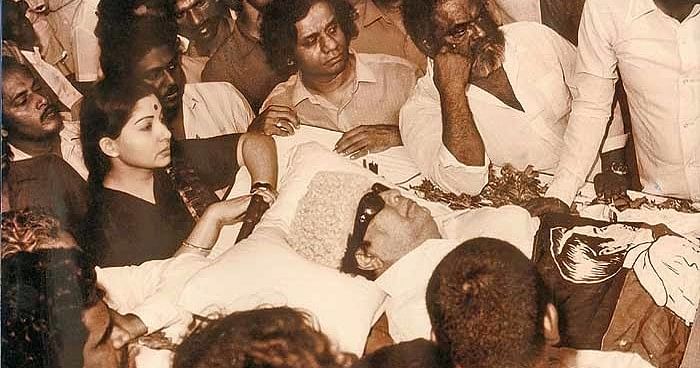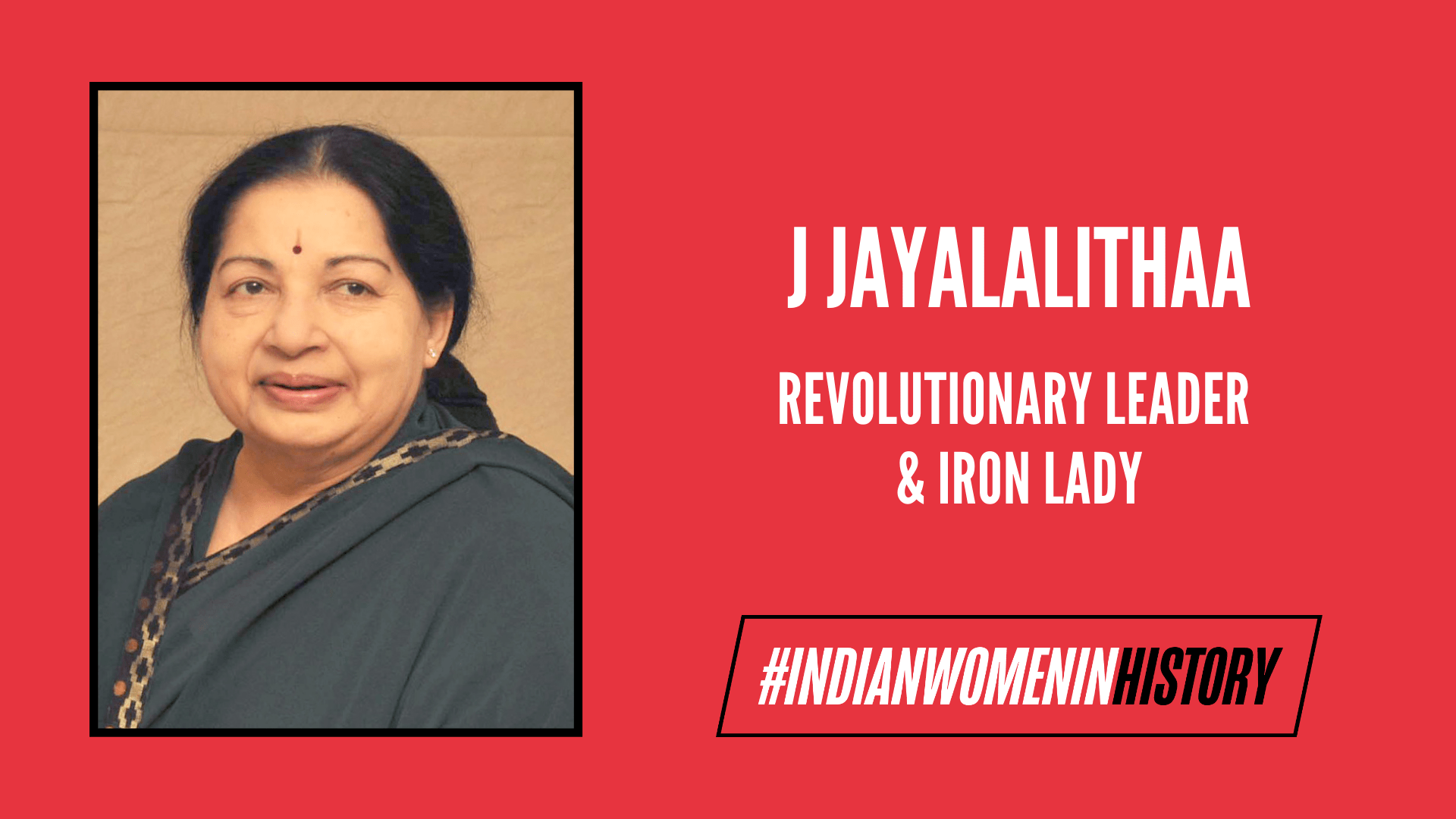Jayaram Jayalalithaa, also popularly and fondly called ‘Amma’ (meaning mother) and “Puratchi Thalaivi” (meaning revolutionary leader) by her admirers, was the six time chief minister of Tamil Nadu. She was also a prominent actor from the 1960s, with a 33-year long acting career and a filmography of 144 films.
J Jayalalithaa was born in Mysore (then, Mandya district) on 24th February 1948, in a Tamil Brahmin family with a traditional upbringing. After her father passed away and her mother, Sandhya, made a mark in the film industry, she and her brother Jaya Kumar, were left under the care of their grandparents. In an interview when asked if she longed for her mothers’ comfort when she used to live with her grandparents, she replied reminiscing an incident; “When I was about 5, she would come to Banglore to see us, and I always used to cry whenever she left. She used to put me to sleep and I always slept clutching her saree pallu in my hands; my mother found it impossible to get up and leave, so she used to gradually unwind the saree from herself, and she used to make my aunt drape her saree around herself and lie down beside me so I wouldn’t notice her leaving.”
Also read: Sonal Shukla: Writer, Educator And Iconic Feminist | #IndianWomenInHistory
Jayalalithaa attended Bishop Cotton Girls’ school in Bangalore, which could perhaps be called the most ‘normal’ days of her life, before she shifted to Chennai and studied in Church Park, Presentation Convent and later, in Stella Maris. She also received a scholarship from the government for her further studies, but thereafter, she entered in the film industry.
Jayalalithaa attended Bishop Cotton Girls’ school in Bangalore, which could perhaps be called the most ‘normal’ days of her life, before she shifted to Chennai and studied in Church Park, Presentation Convent and later, in Stella Maris. She also received a scholarship from the government for her further studies, but thereafter, she entered in the film industry.

A glaring star in the world of limelight
In an episode of Rendezvous with Simi Garewal, Jayalalithaa revealed that she used to be a modest violet during the springtime of her life. “I was just not interested in a film career, I was too shy a person; I never felt comfortable in the glare of limelight”, she had said.
At the age of 12, she performed her first classical dance; however, she was disinterested in the field of fine arts and was more academically inclined. At the age of 16, her mother pressured her to drop her academics, to step her feet in the world of glamour. Though she resisted and rebelled initially, after her mother explained the family circumstances to her, she realised she had no other alternative but to leap into the breach.

She made her debut as a child artiste in the film Sri Shaila Mahatmyam. In 1965, she starred as lead in ‘Vennira Aadai’ (translation: White Dress); and went on to star in ‘Aayirathil Oruvan’ (translation: One Man In A Thousand) with MG Ramachandran (MGR), and they gradually became one of the most sought after pairings in the industry. She played leading roles in 127 films, starring opposite other actors such as Shivaji, Rajkumar, NT Rama Rao, Nageswar Rao, and Dharmendra. Eventually, Jayalalithaa was accorded the status of one of the most accomplished actors of the industry. Her last film was “Nadhiyai Thedi Vandha Kadal”.

However, she didn’t enjoy being in the films. But, she would decided to stick to it, because it was something she had given her commitment to. In the same interview with Simi Garewal, she had said, “Once I decide to do something, whether I like it or not I give it my all, I must excel in it.”
Until her mother passed away, Jayalalithaa was kept sheltered. After her demise, she realised she was a novice, even when it comes to routine activities.
Delving deeper into how her situation was, she said “I didn’t know anything about running a house, I didn’t know how to operate a bank account, I didn’t know how to write a cheque, I didn’t know the meaning of income tax, I didn’t know what the producers were paying me in the films in which I was acting, I didn’t know how many servants we had and what were their salaries, I didn’t know what costs to run a household and an establishment.” The situation was so erratic and haywire that she even tried to take her life.
From cinema to politics; life as a battlefield
Marudhur Gopalan Ramachandran (more popularly known as MGR) was an actor, philanthropist, political leader and filmmaker who served as the chief minister of Tamil Nadu from 1977 till 1987. He was also the founder of AIADMK. He went on to become Jayalalithaa’s mentor as she stepped into the world of politics.
When asked if she loved him, she replied with an innocent laugh and smile, “I think everyone who met him fell in love with him, he was a charismatic figure.”
MGR was the person who opened the gates of politics for Jayalalithaa. Her political career as well as her personal life can be juxtaposed to a roller coaster ride. She said, “It’s probably a good thing I didn’t know beforehand that this is the kind of life I would have to lead, otherwise I would have tried to run away; I never had much say in my choice of career.”
In June 1983, she was appointed as a member of a high level committee, to administer the Chief Minister’s Nutritious Noon meal scheme. In March 1983, she was appointed as the Propaganda Minister of AIADMK. The following year, she filed her resignation from the post of the propaganda secretary stating that she was the reason for all the haphazard and confusion that was prevailing within the party. In 1985, MGR restored her as the Propaganda secretary. Two years later, MGR passed away.

During that time, a video made rounds on the television, which conveyed how Jayalalitha was humiliated at MGRs’ funeral procession.
In February 1989 she became the first woman to be elected as a leader in the opposition and in the same year she was ridiculed and assaulted by the ruling DMK members in front of the assembly speaker and it was at that time she took a vow to enter the assembly only when she was in power.
After Rajiv Gandhi’s demise in 1991, Jayalalithaa formed a coalition with Congress, and during the campaigns assured the voters that her government would be ‘the government of compassion’.
On June 25 1991, Puratchi Thalaivi Jayalalithaa took the oath as the Chief Minister of Tamil Nadu with majority members supporting her in the State assembly.
She also found herself embroiled in several controversies. One of the most stirring issues associated with her was the Tansi land case. The case began in March 1992, when the enterprise of Jayalalithaa, Jaya publications, and the enterprise of her assistant Sasikala, Sasi enterprise, were partners in purchasing land owned by Tamil Nadu small industries corporation. In 1993, Dr. Subramanian Swamy, Member of Rajya Sabha alleged that land has been sold to firms at a depreciated price or the land has been undervalued, and sought permission from the Governor of Tamil Nadu M. Channa Reddy to disqualify her as the MLA. In September 2001, she stepped down as the Chief Minister following the verdict of the Supreme Court in relation to the TANSI land deal case.
Jayalalithaa was also known to be a controlling political leader who would not take criticism lightly at all, to such an extent that the Supreme Court had once observed that Tamil Nadu was the only state to “misuses state machinery to fight defamation cases”. The Court had stated that as a public figure, Jayalalithaa should learn to take criticism well.
Jayalalithaa was also known to be a controlling political leader who would not take criticism lightly at all, to such an extent that the Supreme Court had once observed that Tamil Nadu was the only state to “misuses state machinery to fight defamation cases”. The Court had stated that as a public figure, Jayalalithaa should learn to take criticism well.
Jayalalithaa was accused of misusing her office during her first tenure as the Chief Minister from 1991-96, to amass properties worth INR 66.65 crore; and this allegation made her resign from the post of Chief Minister in September 2014.
On the road of empowering the women of Tamil Nadu
In order to eradicate certain obvious discriminatory practices against women, Jayalalithaa introduced various appreciable policy measures, and one such policy is the ‘Cradle Baby Scheme’. Under this particular scheme, anyone can proffer their new born babies to the state, which promised to look after their fostering.
Another pivotal scheme launched under the government of Jayalalithaa was ‘Thalikku Thangam Thittam’ (Gold For Marriage). Under this welfare program, up to four grams of gold and INR 50,000 were granted to the women from economically weaker sections upon the completion of their Degree/Diploma.
Also read: Rani Umayamma: The Fierce Queen Of Attingal | #IndianWomenInHistory
The government of Jayalalithaa also provided free table fans, mixers and grinders to the underprivileged people of the state. Under her rule, the circumstances of women improved in all the walks of life, including literacy, education, safety and welfare.
The extremely successful Amma canteen scheme ensured that poor people from the marginalised sections of society such as daily wage labourers would not have to go to sleep hungry.
At the age of 68, Jayalalithaa passed away on December 5, 2016. She was under treatment in Chennai’s Apollo Hospital since September. And when she breathed her last, all of Tamil Nadu witnessed grief in a way that was only last seen when MGR had passed away. She was
About the author(s)
Ishita is a student of Political Science (Honors) at Kamla Nehru college, Delhi University. In the world of patriarchy, she is not someone who is afraid to voice out her beliefs and speak up for them. Though mostly cheerful and friendly she is very particular about her deadlines and perfection in her chores





